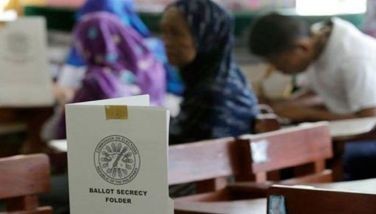Palace exec named to JBC
Manila, Philippines - President Aquino has designated Undersecretary Michael Frederick Musngi of the Office of the President to replace Justice Secretary Leila de Lima as the executive department’s representative in the Judicial and Bar Council (JBC).
The appointment came just before the Supreme Court (SC) yesterday ordered the JBC to reconstitute its membership and remove one of its two current representatives from Congress.
In a letter to the seven-member independent constitutional body, Aquino said Musngi’s designation is “for the sole purpose of participating in the JBC deliberations for the selection of nominees for the position of chief justice.”
Musngi, undersecretary for special concerns, was appointed after De Lima - herself a nominee for chief justice - begged off from participating in the proceedings since she also sits as its ex-officio member.
Musngi will now temporarily replace De Lima.
Lawyer Jose Mejia, regular member of the JBC representing academe, said they received Musngi’s name only in the morning through a designation order signed by the President and endorsed by Executive Secretary Paquito Ochoa Jr.
Mejia said they welcomed Musngi’s immediate participation in the meeting without objection.
“The decision to allow a representative from the executive branch to sit in the JBC was a consensus. No vote was taken,” Mejia told reporters after the JBC meeting.
He explained that all of their members agreed to grant the request of the executive branch to have it represented in the JBC voting for the chief justice vacancy, citing the intent of framers of the Constitution that created the body tasked to vet nominees for judicial posts.
The JBC, now headed by Supreme Court Justice Diosdado Peralta in an acting capacity, earlier granted Aquino’s request to appoint a representative from the executive department who will be his alter ego, in view of De Lima’s absence.
The JBC, which screens applicants for the judiciary, said such official should hold a rank “not lower than undersecretary.”
Musngi is a graduate of the Ateneo School of Law, and has been in government since 2002. He worked at the Government Service Insurance System, the Departments of Agriculture (DA) and Agrarian Reform (DAR) and the Subic Bay Metropolitan Authority.
He is the official representative of the Office of the President as ex-officio board member in the Maritime Industry Authority, the Philippine National Railways and the National Housing Authority.
Ochoa earlier said the executive department - just like Congress and the judiciary - should not be deprived of any “equal representation” in the independent constitutional seven-man body.
“It is upon this constitutional rationale that His Excellency now requests the council’s consideration of his designation of a representative in the council for purposes of the selection of chief justice, vice De Lima,” Ochoa stated in his letter to the JBC.
As Aquino’s alter ego, De Lima is automatically designated as ex-officio member of the JBC, but because of her nomination to become the top magistrate, she decided to beg off from the deliberations, thereby leaving the position vacant.
This was also the case of acting Chief Justice Antonio Carpio, who is supposedly the JBC chairman, but borne of out his nomination and acceptance to the post, he also inhibited from the JBC proceedings.
All three departments in the government - from the executive, legislative to the judiciary - are equally represented in JBC, whose chairman is usually the chief justice and whose members include a senator, a member of the House of Representatives, and the justice secretary.
Members include Sen. Francis Escudero and Iloilo Rep. Niel Tupas Jr. - both chairmen of the justice committee of the Senate and the House of Representatives, respectively - along with those from academe, the Integrated Bar of the Philippines (IBP) and retired justices.
Only one vote
The SC yesterday declared the current setup of the JBC, particularly the representations of Escudero and Tupas in the council, was unconstitutional.
The respective representatives of the Senate and the House are given separate seats and votes in deliberations for judicial posts that have been the practice since 2001.
“The current numerical composition of the Judicial and Bar Council is declared unconstitutional. The Judicial and Bar Council is hereby enjoined to reconstitute itself so that only one member of Congress will sit as representative in its proceedings, in accordance with Section 8(1), Article VIII of the constitution,” read the portion of the 25-page decision penned by Associate Justice Jose Mendoza.
The SC has left to Congress to determine who between Escudero and Tupas should remain to represent Congress.
The high court said the order is “immediately executory,” granting the petition of former solicitor general Frank Chavez in pointing out Article VIII Section 8 (1) of the Constitution stated that there should only be “a representative of the Congress” in the JBC.
The high court dismissed the arguments of Escudero and Tupas that the framers of the Constitution apparently made an “oversight” in assigning just one representative of Congress when the legislature they created was bicameral in nature.
The SC explained the framers did not commit an error in assigning just one member of JBC from Congress.
“A pretext of oversight cannot prevail over the more pragmatic scheme which the Constitution laid with firmness, that is, that the JBC has a seat for a single representative of Congress, as one of the coequal branches of government,” the high court said.
SC spokesperson Ma. Victoria Gleoresty Guerra clarified the respondents could still file an appeal but this will not stop the implementation of the ruling.
Not yet operational
Escudero and Tupas attended yesterday’s meeting before the SC released its decision in the afternoon imposing one-vote rule in JBC for Congress.
“We have not discussed yet as to how the ruling of the SC will be operationalized because as of now we’re not sure if that is already executory,” Mejia explained.
Mejia revealed they have also given the candidates until Monday to complete all documentary requirements, including statement of assets, liabilities and net worth (SALN) for current government officials and waiver on secrecy of bank deposits.
Mejia said only eight have complied as of yesterday morning.
Escudero, for his part, said De Lima should find a way to have the disbarment cases filed against her dismissed by July 30, or her chances to become the next chief justice could very well be over.
Escudero said De Lima has been accorded with an unprecedented degree of leeway to settle the cases filed against her, a total of three based on his count.
Based on the rules of the JBC, any nominee with a pending disbarment case is automatically disqualified.
The JBC met again yesterday morning and according to Escudero, the case of De Lima was discussed considering that she would be the first candidate to be interviewed next week.
“We did not act on this yet. There is still time (for her) to resolve the cases until such time that we provide the short list to President Aquino,” Escudero said.
He said the JBC decided to defer action against De Lima to allow her time to resolve the cases filed against her.
He said De Lima has until July 30, or the day the JBC will vote on who would be included in the short list to be provided to the President.
“While it may seem difficult and near impossible for her to resolve this before we vote on July 30, we do not want to preempt this because sometimes miracles happen,” Escudero said.
“But if nothing changes then the ruling of the JBC would be the same by July 30. Meaning, if the cases are not resolved or cleared, based on the rules of the JBC, we don’t even have to vote on this, she would be disqualified,” he added.
Escudero said the JBC would not make any exceptions to this rule and exclude De Lima from the shortlist of candidates if she is not able to resolve her disbarment cases.
He said it would be unfair to those who were previously disqualified, citing the case of former solicitor general Agnes Devanadera who was disqualified because of a case she was facing before the Office of the Ombudsman.
De Lima earlier said the disbarment complaints filed against her by lawyers Ricardo Rivera and Agustin Sundiam were “political” in nature.
“Candidates who are otherwise qualified invariably do not possess any degree of control over the ill motives of the various characters they may have crossed in their execution of their public functions, and in their diligent and efficient conduct of public office,” De Lima said, citing section 5 of the JBC rules on disqualifications.
De Lima said she would leave her fate to the JBC considering the speed of resolution of the disbarment cases against her is beyond her control.
- Latest
- Trending





























